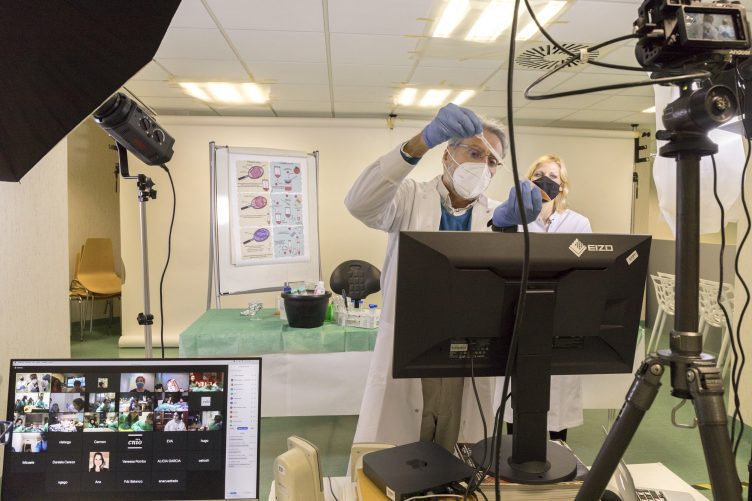This website uses cookies so that we can provide you with the best user experience possible. Cookie information is stored in your browser and performs functions such as recognising you when you return to our website and helping our team to understand which sections of the website you find most interesting and useful.
 A moment from European Researchers’ Night at the CNIO in 2020. /A. Garrido, CNIO
A moment from European Researchers’ Night at the CNIO in 2020. /A. Garrido, CNIO
Almost 300 people have registered for this online event where they will have the opportunity to chat with young researchers and conduct a scientific experiment in their own home.
“Because of the current circumstances, it is impossible this year to open our doors so that people can come to meet us in our home, but we have made great efforts to reach people in theirs and to make the experience friendly and fun,” explains Rafael Fernández-Leiro, coordinator of the activity
This evening, the Spanish National Cancer Research Centre (CNIO) celebrates the European Researchers’ Night with a virtual meeting entitled ‘Meet the Scientists, Be a Scientist’: a scientific outreach event, which has become an unmissable occasion for the Centre, participating for the eighth year in a row.
Between 5pm and 11pm, four groups of people of all ages will share a live science session with young researchers who have volunteered for this initiative, and who will guide them through a science experiment they can do from home with household products, and answer any questions about why they decided to devote themselves to research and what their day-to-day work consists of. In total, 98 connections will be made with 280 people, a record number.
In order to carry out the experiment, in which they will learn how to extract the DNA from a tomato, the participants have received in their homes a ‘science kit’ with all the necessary materials.
The aim of the activity is to awaken scientific curiosity among youngsters, to erase the stereotypes associated with people involved in research, and to show what CNIO’s cancer research involves.
“This is a very special moment that the CNIO researchers enjoy every year,” explains Rafael Fernández-Leiro, Head of the Genomic Integrity and Structural Biology Group and coordinator of the event at the CNIO. “Because of the current circumstances, it is impossible this year to open our doors so that people can come to meet us in our home, but we have made great efforts to reach people in theirs and to make the experience friendly and fun.”
The organisers highlight how astonished they are at many of the questions put to them, and they enjoy the activity as much as the participants themselves. So, every year more and more researchers from the CNIO wish to be a part of this initiative.
European Researchers’ Night is a European Union initiative to publicise the importance of scientific knowledge, held simultaneously in 350 European cities. In Madrid, it is promoted by the Department for Science, Universities and Innovation and coordinated by the Fundación para el Conocimiento madri+d. The project is funded by the European Union under the Horizon 2020 Research and Innovation Programme – Marie Sklodowska-Curie Actions.
At CNIO, the event is part of the Centre’s outreach strategy through the Dean’s Office, along with the CNIO Training Programme. “CNIO has participated in European Researchers’ Night since 2013. For us, this is a very special event that we particularly enjoy. Seeing the excitement of the children when they are doing their own experiment is priceless,” says Marisol Soengas, Head of the Dean’s Office.
Other CNIO initiatives that aim to bring science closer to society are CNIO Arte, a project that brings together scientists and artists to create new works of art around scientific research, and CNIO Friends, a philanthropic platform through which any person, company or association can collaborate with the cancer research carried out by the Centre, and through which a ‘CNIO Friends’ International Contracts Programme has been promoted to attract research talent.
